Mary fights back with her love for the game
Born and raised in Mumbai’s Matunga, Mary has been living on the streets with the threat of eviction looming over her life from a very young age. Despite being eligible for rehousing, everyday poses a new fear. Amidst the odds of no permanent home structure, the family is at the mercy of civic authorities, who often damage their belongings and break their house down. The cycle of evictions and rebuilding homes is a frequent affair in the lives of Mary and her family. She has changed schools often, based on the family’s varying economic conditions, living with poor access to nutrition and basic hygiene. Through these trying circumstances, Mary, through her love and dedication for football, has made her way to becoming a football ranker in Maharashtra, and dreams of representing India one day.
Here’s the story of Mary Prakash Naidu whose kickoff with football gives her hope for a life off the streets, someday.
A Life No Less Ordinary
17-year-old Mary Prakash Naidu is no stranger to fame. As one of Maharashtra’s top 20 female footballers, she has been playing for the Mumbai District Football Association and taken part in many tournaments so far. In 2017, she was felicitated by Prime Minister Narendra Modi at the Jawaharlal Nehru Stadium in Delhi during the FIFA U-17 World Cup as part of the Centre’s Mission 11 Million Programme, an initiative to encourage football playing in schools. Mary had the best record in ball dribbling and shooting (only 13 seconds) at the trials for this event. She also got to meet her favourite player Sunil Chhetri.
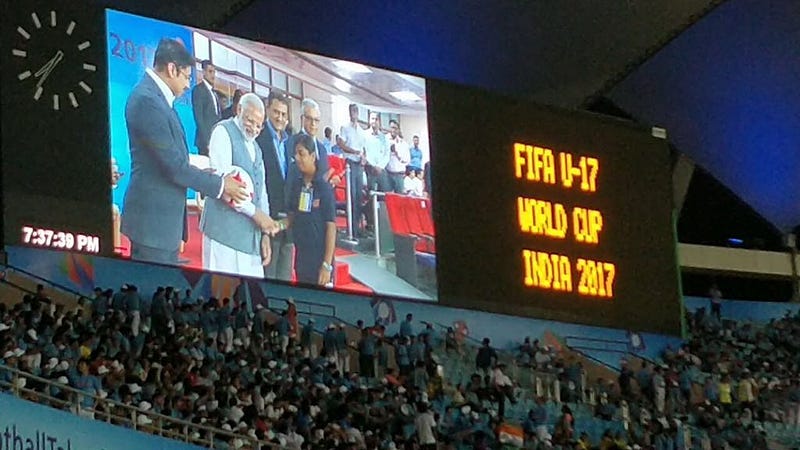
‘The press flocked around us after the event. Some ministers reached out to us and assured help, but it has been months now and there has been no change in our situation’, says her father Prakash Naidu, a contractual staff working with the Brihanmumbai Municipal Corporation.
The State at Home

The ‘situation’ is the state of homelessness and deprivation that the family has been facing for years now. For over 20 years, the family has been living on the streets in Matunga (Mary was born here), with the threat of eviction looming large over their life, even though they possess documents before the state cut-off date that make them eligible for rehousing. ‘I am not at ease even when I am playing. I keep thinking of my father at work, and my mother and two sisters alone at home. What if the bulldozers were to arrive?’ she says.
Before the felicitation, Mary recalls the detailed rehearsal and the way they were instructed on how to receive their prize. ‘I was very excited and a little nervous’, she said. No one at the event, however, spoke about the challenges being faced by the likes of players like Mary, their state of housing, or the demand for and lack of playing spaces.
Evicted at Will
On the day we meet Mary, the family has moved all their possessions from their makeshift structure to a spot beneath a tree nearby — there has been talk of an impending eviction again.
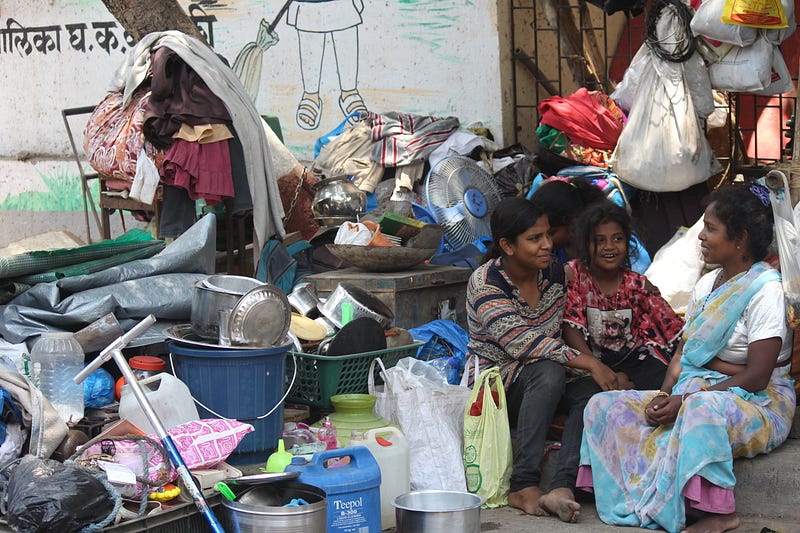
These threats have rapidly increased in frequency in the last eight years. ‘We have lost too many things to repeated evictions already’, says Mary. Two trophies stand gleaming, and Mary points out that these are just the few they have been able to save. ‘During an eviction, we lost a bagful of my trophies. My standard X books and certificates were also taken away’, she said. A wall of their house, comprising of a flex printed and bound with narrow wooden boards, flaps and falls face-down in the breeze. It’s a gigantic poster announcing Mary’s felicitation by the Prime Minister.
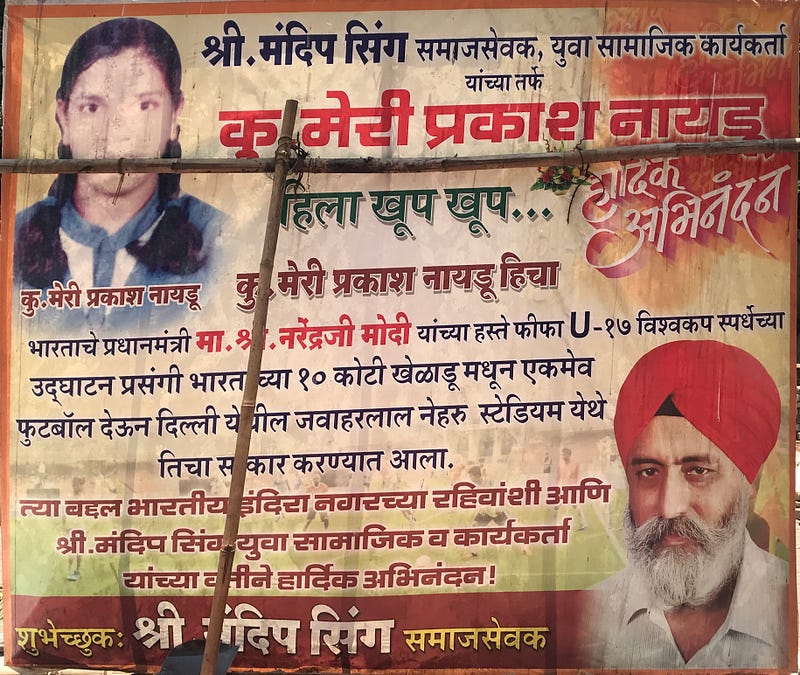
Making Room for Play
Mary was introduced to various sports — karate, football, hockey, and boxing — about six years ago. Her interest in football grew as she got to know more about the game. That was about two years ago. At that time, there was only a boys football team in the area and she joined them. As her interest in the game developed, her practice sessions grew longer and she started playing at the nearby Khalsa College grounds every now and then with the support of a non-profit organisation, Anstrengung United.
‘We play in between the houses often, as it’s not safe for girls to venture out here and there. Due to the lack of space the football gets spoilt easier; often it enters someone’s house, smashing into some items, and we get a round of scolding. No one’s ever stopped us though’, she smiles and says.
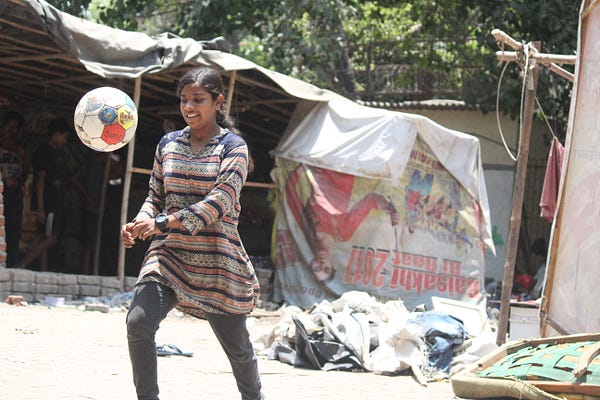
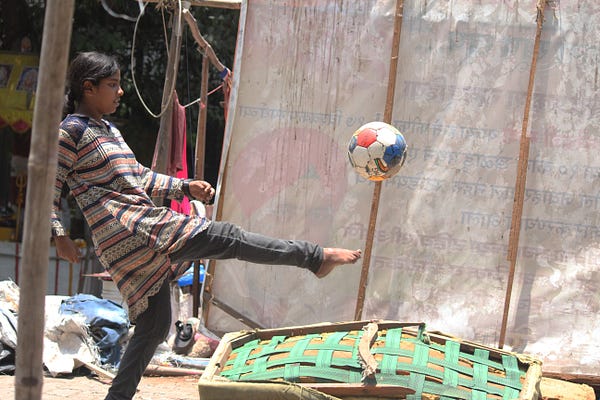
No Respite from Daily Woes
There are no water facilities in the area. A few taps existed earlier but they have now broken, forcing the families to walk a long distance, queue up for water and carry it back. A pay-and-use public toilet nearby is accessed by the community. No formal electricity connections exist here either. Some tapped lines provide temporary relief. ‘We placed forward our demand for housing and a playing ground for the children. Chief Minister Devendra Fadnavis even sent a letter about our housing situation to the concerned ministry, but life is still the same here’, says Mary’s father.
Given their state of housing, Mary finds it difficult to study. Sometimes she sits under a tree nearby and tries to concentrate, but it’s very difficult to study for more than half an hour to one hour without getting interrupted. What hasn’t helped is the number of times she has needed to change schools, based on the changing fortunes of the family, and the help they have received from others. The family’s diet is also sparse. ‘As an emerging football player, she should get nutritious food. But how will I be able to afford it’, rues her father.
#UprootedChildhoods is a collaboration between YUVA and Leher, attempting to spark dialogue on a critical yet oft invisibilised concern — the views of children on housing. The campaign draws from YUVA’s in-depth interventions with children over the years across cities, and Leher’s focus and commitment to child rights, with a preventive approach towards child protection. Through the different blogs, photo essays, video stories, infographics and other formats we hope to present many faces of urban childhoods. Stay tuned.



